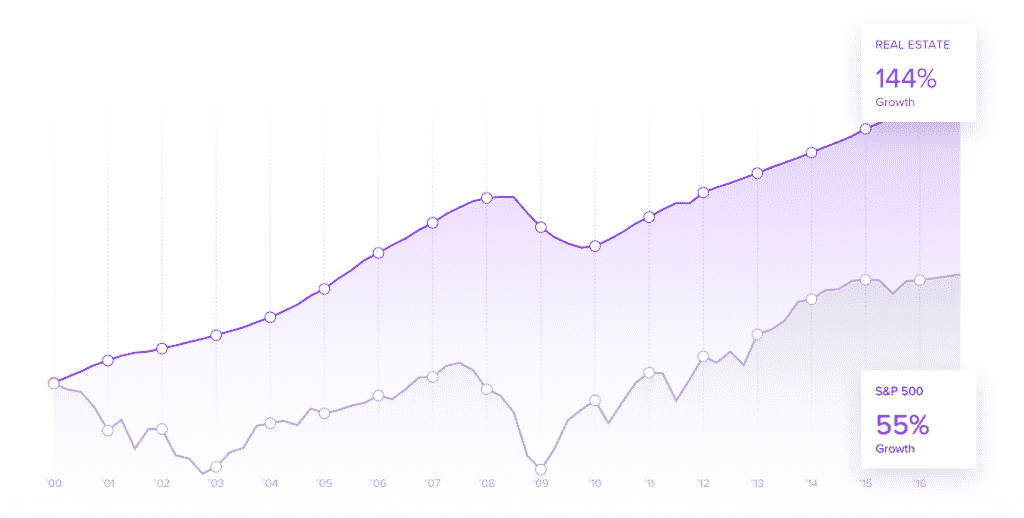

Fundrise is an online platform that matches investors with real estate investment opportunities. So you might be wondering is Fundrise a REIT?
A lot of similarities exist when we compare Fundrise Vs REIT investments. Both make real estate investing affordable and accessible to non high-net worth individuals.
And it’s possible to invest in residential real estate, commercial property, and single family homes through both Fundrise and REITs.
But Fundrise is much more than a traditional real estate investment trust. It offers an eREIT as part of its product lineup as well as an eFund, which aims to buy land and develop properties for residential homeowners.
Plus, Fundrise makes it easy to track investment performance day and night via its online dashboard. So is Fundrise worth investing in? We compare fees, returns, tax implications, and investment minimums to help you make a more informed decision.
REIT vs Fundrise Comparison
| Real Estate Investing | Fundrise | REIT |
| Reviews | Fundrise Review | REIT Review |
| Minimum Investment | $500 → $1,000 | Varies |
| Dividend Frequency | Quarterly | N/A |
| Fees | 1% | ~1% |
| Non-Accredited Investors | ✅ | ✅ |
| Diversified Investments | ✅ | ✅ |
| Passive Income | ✅ | ✅ |
| Liquidity | ❌ | ✅ |
| Leverage | ✅ | ✅ |
| Tangible Asset | ✅ | ✅ |
Why Choose REIT or Fundrise
A big attraction to Fundrise or REIT investments is the diversification they offer away from the stock market.
Real estate returns compared to stock market returns have been impressive this century.
Rich Uncles, an online real estate crowdfunding site that specializes in commercial real estate, researched the total stock market returns from 2000 → 2016 and compared them to real estate returns.
The research showed that real estate returns of 144% far eclipsed S&P 500 performance returns, which produced a gain of 55%.

Over different time periods, the stock market performance has beaten the returns of real estate. Nevertheless, the diversification into real estate as an asset class can be a boon for investor portfolios.
If you already have exposure to the stock market, it makes a lot of sense to diversify into real estate but how? Below we compare Fundrise vs REIT investments on key factors like investment minimums, taxes, and fees.
If you're worried "transitory" inflation and "mild" recession will be worse than expected...
Gold and commodities helped during volatile times. BUT one asset 99% of investors miss helps protect your portfolio and has outpaced the S&P by 131% over the past 26 years.
Art.
And while historically you've needed millions to invest, one platform lets you invest in famous paintings for as little as $20.
You can skip the waitlist and become a Masterworks member today with this private link.
See important Reg A disclosures: Masterworks.com/cd
What Is a REIT?
A REIT is a real estate investment trust that makes equity or debt investments in commercial real estate.
They are aimed at individual investors seeking passive income and are a way to gain exposure to real estate without actually purchasing a property outright
Typically, they are very liquid so investors can cash out when they wish and investors are shouldered with none of the usual burdens of managing property.
REITs usually fall into one of three buckets:
- Private REITs
- Public REITs
- Public non-traded REITs
Private REITs usually have higher minimums so most investors are left to choose between publicly traded REITs or public non-traded REITs.
➤ Free Guide: 5 Ways To Automate Your Retirement
What Is Fundrise?
Fundrise is an online real estate company that enables investors to buy a share of residential and commercial properties.
Investors pool money so they can afford properties that may otherwise have been too expensive for any single investor.
Fundrise investors enjoy many of the similar benefits afforded to REIT investors, such as:
- Passive income
- No expertise needed
- Regular cash flow
- Diversification
Fundrise features two main products.
- eREITs, which are income-producing private real estate investment trusts
- eFunds, which pool investors’ money to buy and develop land and housing
>> See The Best Real Estate Crowdfunding Sites
Fundrise vs REIT
Investment Minimums
REIT Investment Minimum
REITs are one of the most accessible ways to invest in real estate, which is why investment minimums are generally low.
Typically, publicly traded REITs usually carry lower minimums than private REITs.
The investment minimums can be as low as $1,000 or even less in spite of high acquisition costs and operational expenses.
Fundrise Investment Minimum
The Fundrise investment minimum is between $500 to $1,000.
- eREIT minimum: $1,000
- eFund minimum: $500
Thanks to forgotten 50-year-old legislation, often ignored by investment advisors, gold bugs, and silver hounds... You can now collect $10,000 or more in free silver.
Millions of Americans know NOTHING about this... Because it exploits a "glitch" in the IRS tax code that helps protect your retirement... While paying ZERO TAXES & PENALTIES to do it. That's why you need to see this NOW.
Click Here to get all of the details in this FREE Kit
Fundrise Fees vs REIT Fees
Fundrise Fees
Fundrise charges a management fee of 0.85% and an advisory fee of 0.15% for a total fee charge of 1% annually.
How Much Are REIT Fees?
The fees to manage REITs are usually in the ballpark of 0.50% annually.
This the charge applied to manage trust assets, and excludes other expenses that may apply.
| REIT Vs Fundrise | Fees |
| REIT Management Fee | ~0.50% |
| Fundrise Management Fee | 0.85% |
| Fundrise Advisory Fee | 0.15% |
Fundrise & REIT
Investment Strategy
REIT Investments
REIT Investment strategies can vary widely but generally aim to benefit investors by providing diversification, regular cash flow and tax benefits.
Solo investors in rental properties would find it very difficult to replicate the diversification possible through a REIT, which may have hundreds of properties under its umbrella.
An individual may find returns impacted significantly if a single property needs extensive renovation or repairs whereas a REIT property that requires capital investment may only slightly affect overall returns.
REIT investments generally offer a steady flow of dividends monthly. The monthly or quarterly distributions are ideal for investors seeking passive income.
Legally, REITs must distribute at least 90% of their taxable income but investors can claim a 20% tax deduction from earnings from loan interest.
REITs also avoid double taxation at the company and individual investor level.
Fundrise Investments
The portfolio options include:
- Starter
- Supplemental Income
- Balanced Investing
- Long-term Growth
In each portfolio is a mix of eREITs and eFunds. The mix and selection is decided by Fundrise.
>> Check Out Real Estate Investing For Dummies
Fundrise Returns vs REIT Returns
Fundrise Returns
Net of fees, Fundrise returns have been:
| Year | Fundrise Performance |
| 2017 | 11.44% |
| 2016 | 8.76% |
| 2015 | 12.42% |
| 2014 | 12.25% |
REIT Returns
According to REIT.com, total returns for REITs last year averaged 9.27%.
REIT vs Fundrise:
Which Is Better?
| REIT Wins | Fundrise Wins |
| ✅ Low Investment Minimum: Publicly traded REITs have low investment minimums, generally lower than ones imposed by private REITs such as those operated by Fundrise. | ✅ Passive Income: Investors seeking regular cash flow can receive dividends quarterly from Fundrise. |
| ✅ Liquidity: REIT shares can be bought or sold freely in public markets, so access to cash is simple and fast. | ✅ Product Selection: Fundrise offers more than REIT products – it also offers an eFund which is aimed at investors who want exposure to residential development opportunities. |
| ✅ Low Fees: Management fees for public REITs tend to be around 0.50% compared to 0.85% for Fundrise. | ✅ Track Investments: Unlike publicly traded REITs, Fundrise provides an online dashboard to track investments 24/7. |
| ✅ Tax Deduction: REIT investors can claim a 20% tax deduction from earnings. | ✅ Returns: The returns generated by Fundrise have historically eclipsed the average returns of publicly traded REITs. |
REIT vs Fundrise
Comparison Summary
Fundrise costs more than the average publicly traded REIT but it has also generated higher returns.
For investors who prioritize performance, Fundrise may be a better match – though future returns cannot be guaranteed.
The drawback of investing with Fundrise is your money is tied up whereas in a publicly traded REIT you can cash out anytime.
What Fundrise lacks in liquidity it makes up for in product selection. Beyond REITs, an eFund offers investment opportunities in land and development for sale to residential homeowners.
It’s also possible to track investments day or night via the Fundrise dashboard, a luxury not available to REIT investors.
Overall Fundrise has earned its stripes as one of the best real estate crowdfunding sites online so if you are eager to diversify away from the stock market it is well worth checking out.
If you're worried "transitory" inflation and "mild" recession will be worse than expected...
Gold and commodities helped during volatile times. BUT one asset 99% of investors miss helps protect your portfolio and has outpaced the S&P by 131% over the past 26 years.
Art.
And while historically you've needed millions to invest, one platform lets you invest in famous paintings for as little as $20.
You can skip the waitlist and become a Masterworks member today with this private link.
See important Reg A disclosures: Masterworks.com/cd









Leave a Reply